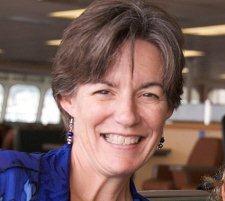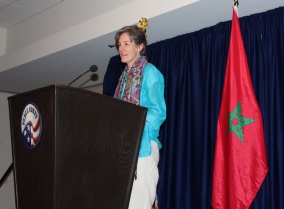Amie Bishop (Morocco 1983-85) Remembers Her Friend, Chris Stevens
Marian Beil (Ethiopia 1962-64) and Tino Calabia (Peru 1963-65) set up a petition on SignOn on October 19, 2012 to rally the Peace Corps Community to ask the Peace Corps to honor RPCV and Ambassador Chris Stevens (Morocco 1983-85) at the Peace Corps Headquarters.
A month later, in mid November, the Acting Director Carrie Hessler-Radelet (Western Samoa 1981-83) said the agency would do so, and on May 2, 2013, in Shriver Hall an event was held by the agency.
The Celebration of the life and Service of The Honorable J. Christopher Stevens was a simple and touching event, with short words of rememberance from former Morocco Country Director David Burgess; fellow Morocco Peace Corps Volunteer Amie Bishop; Ambassador Stevens’ Father Jan Stevens; Ambassador Stevens’ Sister Hilary Stevens; and Ambassador Stevens’ Mother Mary Commanday.
In the days to come, we will post the remarks by the friends and family of Chris Stevens.
Peace Corps Dedication to Chris Stevens- May 2, 2013
By Amie Bishop (Morocco 1983-85)
I am deeply honored to be asked to speak today—to be here with Chris’ family, friends, former co-workers, and some of our fellow volunteers from Morocco. I want to share some reflections of Chris, the Peace Corps, and of the legacy Chris has left us.
Chris’s easy, laid-back California nature and understated sense of humor endeared him to everyone pretty quickly during the first months of training. I believe it is safe to say that we were all were impressed by his impeccably pressed and seemingly endless supply of khakis. How was he doing that? Speaking for myself, by our second year, I was quite sure he was receiving secret shipments of pants.
In any case, he and I quickly became friends-we both had California roots, loved to run, and found humor in many of the same situations we found ourselves in. Our observant Peace Corps training director mistakenly thought that we were dating and posted us in neighboring villages-this turned out to be hugely important to me, especially, because, while Chris was posted in an idyllic Atlas mountain village, I was assigned to what turned out to be the prostitute hub for the region. Needless to say, I spent a lot of weekends visiting him and we were each other’s main support during that first year, growing up together, not realizing at the time what an incredibly formative period in our lives this time would be. Our favorite past time, aside from hiking in the hills around his village, was comparing our latest cultural blunders. My favorite of his was when he confused the hours of the town’s 1 hammam (public bath) and walked in on a bunch of half-dressed Berber women, who went screaming from the front room. But he was unflappable and rather than withering with embarrassment, he found the humor and goodness to glide right past it.
Our walks in the hills around his village were usually accompanied by one of his students or a teacher from the school, especially his fellow English teacher, Abderahim Tbany, with whom Chris remained in touch until his death in Benghazi. Chris was well-liked by his community. I am sure they were responding to the clear happiness and joy he took from immersing himself in their world. He was committed to doing his best—–supported by a wonderful combination of humility, dedication, warmth, and humor. And his Arabic was improving much faster than the rest of us…. About 6 months into our assignments, he came to visit me in my town and my neighbors invited us for lunch. Very soon after we settled in, the mother in the family started poking me and asking why Chris spoke Arabic so much better than I did-“Why can’t you speak like him?!”
There is no question in my mind that Chris’ Peace Corps experience, built upon his already kind, open, and inquisitive nature, laid the foundation for the kind of diplomat he would become. He truly exemplified the sort of cultural intelligence that can be gained only through deep respect of others, through the hard work of learning another tongue, and through participating fully in new surroundings: for example, by partaking in simple acts such as sitting on a tree stump in an olive grove to share tea with a Berber family, as we did once on one of our hikes.
The world needs more Chris’s, although he himself is irreplaceable. Rather than focus on the terrible loss we all suffered upon hearing the news of that tragic night, I have tried to find comfort in appreciating what Chris has left behind. For me, personally, that has been a reawakening of long-faded memories of the most impressionable time in my life, as well as the awareness of the power and endurance of the friendships forged at that time. Born out of this loss, as well, has been an emerging and wonderful friendship with his sister, Anne, who also lives in Seattle. I am so grateful for this new friendship and for the glimpses I sometimes see of Chris in her.
For the world, he has left behind the finest testament there is to the power of total immersion into unfamiliar realities as a way of bridging and even solving the world’s ills. His sort of diplomacy was characterized by participation, respect, listening, learning, and laughing. He already had those innate abilities, but I have no doubt that his Peace Corps experience allowed those qualities to blossom so that, whether as a Peace Corps volunteer in Morocco, or a diplomat in Egypt or Syria or Israel or Libya, or, finally, as an Ambassador, Chris was just as likely to be found, on any given day, sipping tea on a tree stump with the locals.
Thank you, Peace Corps, for honoring my friend, Chris; for giving him and me, and my fellow former volunteers the opportunity to share an unforgettable chapter in our lives; and for helping shape one of the finest diplomats of our time.

Amie Bishop (Morocco 1983-85)